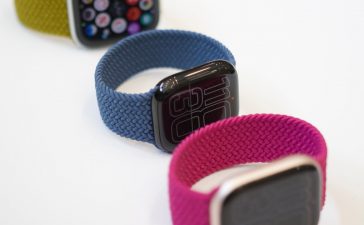Expert’s Rating
Pros
- Blessedly neutral sound
- Bose wrote the book on active noise cancellation, and it’s terrific here
- Easy to operate, with dedicated push-button controls
Cons
- You won’t get Bose’s new spatial audio processing
- While not Bose’s most expensive headphones, they are pricey
- ANC tends to freak out on bouncy bus rides
Our Verdict
Bose’s second-best active noise-cancelling headphone features new control options, including Spotify Tap; its analog audio cable gains a microphone; and its battery run time stretches to 24 hours. It’s solid value.
The all-new Bose QuietComfort Headphones are sneaky little devils. They’re subtle in persona, but immensely capable and always good company. Building on Bose’s mainstream QuietComfort 45 over-ear noise-cancelling headphones, this new and simpler-named model does justice to any and everything musical and spoken, from your favorite artists’ albums to podcasts and mobile phone chat-ups that rival in-person conversations.
If you’re more interested in stereo than the spatial audio experiences Bose promises to deliver with its pricier QuietComfort Ultra, you’ll want to consider these cheaper cans.
Design & build
If not for a new color option (Cypress Green) and a different tone and texture of brand embossing on the headphones and carry case), you might take the Bose QuietComfort Headphones for their predecessor, the QuietComfort 45, which were likewise brought to market at $349. A true sleuth would also detect a slightly grainier (and evidentially sturdier) grade of vegan leather wrapped around the ear cushions.
The longer I listened to the Bose QuietComfort, the more I came to appreciate their neutral, coloration-free nature.
The 3.5-to-2.5mm analog audio cable accompanying this new model is also outfitted with an inline microphone. Plugging the cable into your smartphone, tablet, or computer turns off the headphone’s Bluetooth radio and onboard mics.

Bose QuietComfort Headphones come with a 3.5-to-2.5mm analog audio cable (with an inline mic), a USB-C to USB-A charging cable, and compact hard sided carry case. You’ll need to supply your power adapter to charge them.
Jonathan Takiff/Foundry
Hard buttons (hooray!) on both ear cups work just as well as on they did on the QC 45. (Give me dedicated volume control or give me death!) But the Action button on the left-hand cup gets a new optional function: Spotify Tap. Pressing it triggers your Spotify app to launch and begin playing tunes, even if you’re on the free version of the service. Alas, when I tried it, it didn’t resume the last thing I’d played on Spotify: an episode of late-night TV hosts’ collaborative schmooze session Strike Force Five.
This review is part of TechHive’s in-depth coverage of the best noise-cancelling headphones.
Sound quality
Truth be told, I felt a little, well, underwhelmed when I first listened to the new QuietComfort Headphones. They certainly aren’t razzle-dazzlers that hit you upside the head with tons of bass, or make you squirm from vocalists so aggressively forward they seem perched on your nose. Nor do they elicit a high-end response so sharp it could scoop the wax right out of your ears.
But the longer I listened, the more I came to appreciate their neutral, coloration-free nature. Some might even describe their response as “flat,” but that’s misleading. The new QuietComfort are fully engaged, just playing it cool.

The 2023 version of the Bose QuietComfrt Headphones got me going while listening to great recordings from Joshua Redman, Bruce Springsteen, the British musical Operation Mincemeat, and a seriously restored and expanded Who’s Next.
Jonathan Takiff/Foundry
Wherever the music goes, sublimely delicate to dark and pounding, they follow, present, and flesh it out in seriously realistic, warts-and-all fashion. What they don’t do is impose a club-you-over-the-head “signature sound,” or any other personality that might be at odds with the artist’s intent. I’m lookin’ at you, Beats.
Indeed, these comfy headphones carried me away on stress-free, long-distance, long-play musical journeys as I tripped from jazz saxophonist Joshua Redman’s elegant Where We Are to Bruce Springsteen’s The Live Series: Songs of New Jersey. The latter freshens some of his classics with intimate, downsized arrangements that artfully demonstrate the QuietComfort’s skill at nuance and presence. I could even hear the piano keys and accordion buttons clicking.

The new Bose QuietComfort Headphones are available in a limited-edition Cypress Green (worn by the author in this shot) as well as White Smoke and Black.
Jonathan Takiff/Foundry
This sonic traveler next made a happy British sonic connection, so the West End London cast of Operation Mincemeat could sing and rap through a daffy yet true tale of WWII Nazi misdirection that helped win the war. Through these headphones, I felt like I was in the theater where it happened—the show, that is—and could fathom almost every word. No Brit-to-American translations were required.
The well-engineered Bose QuietComfort Headphones don’t compress or blur the music when you crank the volume up to 11, either. Credit Bose’s active equalizing circuitry, which adroitly varies frequency response relative to the volume without a listener ever noticing. At aggressive listening levels, the processing tamps down the heaviest bass frequencies which, left untamed, would otherwise hog the party.

1. While a little dab of EQ boosting was all I ever wanted with these musically neutral, well-balanced headphones, preset options do offer bolder bass and treble adjustments.
Jonathan Takiff/Foundry
If you find this Swiss-like sonic neutrality lacking, there’s always the option to make custom EQ tweaks in the Bose Music app, pushing the bass, mid-range, and high-frequency sliders up and down in 0.6dB increments. Or you can tap the more radical bass- and treble-shifting presets.
As a detail freak, I was happy to boost the treble just a notch to enhance the romantic, old-world instrumental sweep of “Fourth of July, Asbury Park (Sandy)” while listening to the Springsteen concert set. I also did just a tad of touch-up to revel in classics such as “Won’t Get Fooled Again,” streamed from Qobuz as a 24-bit/96kHz Life House deluxe edition of Who’s Next. I heard details in Pete Townshend’s slash-and-burn guitar work and Keith Moon’s hyperactive percussion that were never in evidence before.
Active noise cancellation performance
Bose’s truly terrific active noise cancellation helps to reveal small details in music in a natural way. There’s no need to crank up the volume to pull out the background sounds on a recording, the subtle stuff that might otherwise be masked by ambient/environmental noise.
New to this model, active noise cancellation can be fine-tuned to let more (or less) of the outside world into your ears. And the wind reduction mode, which I set up for one-button-tap access, does a great job of vanquishing the wooshy wind noises that attack most headphones’ microphones during walk-abouts.

Apart from the color, it’s hard to tell the new Bose QuietComfort Headphones QC Headphones (left) apart from the QC 45 they replace. The bulk of the updates are under the hood.
Jonathan Takiff/Foundry
I experienced just one cog in the works, something I’ve repeatedly encountered and that I suspect is related to the way Bose performs active noise cancellation, the fashion it suspends the drivers in its headphone assemblies, or both.
Just as I experienced with the Bose Noise Cancelling Headphones 700 and the Bose QuietComfort Earbuds, these new QuietComfort Headphones tend to exaggerate, rather than suppress, rattling bus suspension noise. This has been noticeable when I’m hauling between Philly and New York on a Megabus and the wheels hit a pothole. Solutions? Move to the less-reverberant upper deck. Or next time, take the train!
Battery life & charging
Bose says the battery on this new model will last longer on a charge: 24 hours versus 22 on the QC 45. As for recharging, Bose says it can be done in 2.5 hours. But in my first-and-only attempt, the battery was only restored to 70 percent in that time frame (I used an Anker IQ Nano II power adapter).
In retrospect I’m thinking a different charger (one with fixed output, rather than variable) and/or a different cable would have delivered better results. This is hardly the first product I’ve tried that’s balked on connection to one charger but not another.
Should you buy the Bose QuietComfort Headphones—or wait for the QC Ultra?
As you probably know, Bose is on the cusp of shipping a higher-end—and higher-priced—headphone, the QuietComfort Ultra. The Ultra offers Bose’s homegrown take on spatial audio, and a step up in Bluetooth connectivity (Bluetooth 5.3, compared to the multipoint connection 5.1 in the Quiet Comfort Headphones).
The Ultra wasn’t available for review as of this writing, but Bose says it will deliver even better sound (with different drivers), more advanced active noise cancellation (with additional microphones), and a customized, automated user tuning process. Bose also seeks to extract an extra $80 from your credit card for this model.
For 90 percent of the populace, the Bose Quiet Comfort Headphones will deliver the essentials—and then some—to elicit a 100 percent satisfaction level.







